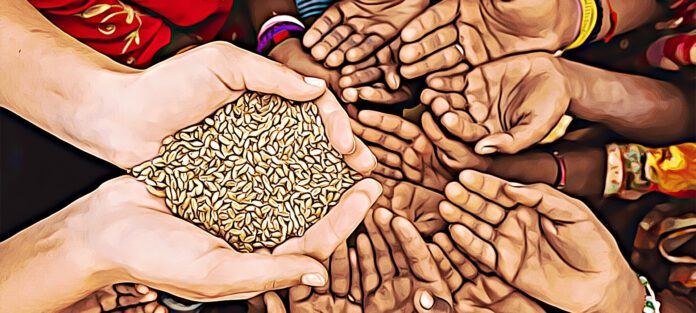The results for the General Election 2024 are continuing to filter in. The weeks to come will see independents swear their loyalties and a government start to take shape. But whoever eventually comes to power will have very little time to settle in.
Hitting the ground running will be particularly important when it comes to the issue of food security — perhaps one of the most pertinent issues in the economy that remains untalked about. The new government will have to introduce a budget barely four months into their term in June. Last year’s budget presented by Ishaq Dar was woefully inadequate when it came to addressing the food security conundrum.
As an agrarian economy, Pakistan has long relied on the fact that it is capable of producing enough food to fulfil the caloric requirements of its own population, and then have enough leftover to be an exporter. Historically this has been true. Over the past few years, however, the country has emerged as a net importer of food.
Food security is possibly one of the biggest problems facing Pakistan right now. In an international ranking of the Global Hunger Index (GHI) this year, the country ranked 92 out of 116 nations, with its hunger categorised as ‘serious.’ Pakistan currently faces a scenario in which it is largely food sufficient but not food secure. Despite Pakistan being ranked 8th in producing wheat, 10th in rice, 5th in sugarcane, and 4th in milk production, a 2019 report of the State Bank of Pakistan (SBP) showed that nearly 37% of households in Pakistan are food insecure. In the four years since the SBP’s report, matters have only worsened. Food price inflation in Pakistan has been in double digits since August 2019. The cost of food has been 10.4-19.5% higher than the previous year in urban areas and 12.6-23.8% in rural areas, according to figures published by the Pakistan Bureau of Statistics.
Though agriculture is a provincial subject, food security has a national mandate, as seen in the plethora of agriculture research institutions at the federal level. The 2023-24 budget really doesn’t do much to solve any of these deep rooted issues. The federal government has allocated Rs21 billion in the budget for 2022-23 under a three-year Growth Strategy for improving the output of crops and livestock, countering climate change impact, promoting smart agriculture, value-addition and agro-processing. It has also announced Rs11bn for the provision of the latest machinery, laser land-levellers and quality seeds for the agriculture sector and enhancing exports of farm produce. In terms of relief, the government has abolished sales tax on tractors, other agriculture tools as well as seeds and has made customs duty zero on import of agricultural tools, irrigation systems, harvesting machines, greenhouse farming and for agro-based industries.
It has increased subsidies for fertiliser plants from Rs6bn in the outgoing year to Rs15bn for the year 2022-23, a 150pc hike. A separate allocation of Rs6.0bn has been made as a subsidy for urea compost import. The government has apportioned Rs10bn for agriculture relief initiatives without giving any details in the budget documents.
As the new government comes in, they must realise that the country is far from prepared to deal with a food crisis. On the one hand our agricultural productivity is unable to keep up with population growth. Then there is the problem that there seems to be no end in sight to the war in Ukraine which has choked international supply-lines. With no private investment in the country’s agriculture and a climate crisis causing floods and abnormal crop growth, there is a serious need to focus on food security.




